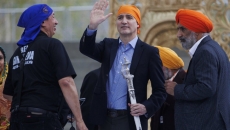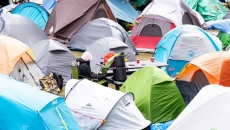What happens after British Columbia's indecisive election? British Columbians went to the polls Saturday, but now face a week or more before knowing the result, and whether the NDP's David Eby will keep his job as premier or if B.C. Conservative Leader John Rustad will take charge, or if there might be a new election.
Here's how events could play out:
WHAT'S THE CURRENT SITUATION?
The initial vote count ended on Sunday with neither the NDP nor the Conservatives winning the 47 ridings needed for a majority in the 93-seat legislature.
The NDP is elected or leading in 46 ridings, and the Conservatives in 45, while the Greens won two seats.
But two hand recounts have been triggered in ridings where the NDP is narrowly leading, because the margin is fewer than 100 votes. Candidates in other ridings also have until Tuesday to ask for recounts, if the margins are close enough.
WHAT HAPPENS NEXT?
Elections BC says the recounts in Juan de Fuca-Malahat and Surrey City Centre will occur as part of the final count on Oct. 26 - 28.
It will also be counting about 49,000 absentee and mail-in ballots at the same time.
WHEN WILL THERE BE A RESULT?
Elections BC says results will be updated on its website while the final count progresses.
WHAT'S THE PATH TO VICTORY?
For the B.C. Conservatives to win, they will likely have to flip the lead in both Juan de Fuca-Malahat and Surrey City Centre, as well as hang onto other ridings where they already have narrow leads.
This scenario would result in a one-seat Conservative majority, and Rustad could become premier.
To secure a majority, the NDP would have to win both Juan de Fuca-Malahat and Surrey City Centre, and pick up at least one riding where the Conservatives now lead.
Failing that, the NDP must hang on to at least one of the recount ridings, then secure the support of the Greens. As the incumbent government, the NDP would be given the first option by Lt.-Gov. Janet Austin to try to forge a minority government with the Greens' help.
The Conservatives could also seek to form a minority government with the co-operation of the Greens, but the ideological gap between the two parties is wide.
WHAT ABOUT THE SPEAKER?
The situation is complicated by the need to appoint a speaker, reducing the government's numbers by one.
Even if the Conservatives end up with 47 ridings, it would be hard to govern. Rustad could recommend a new election to break the potential deadlock.
If the NDP secures 46 ridings and the co-operation from the Greens, the two-seat buffer would make governing challenging but workable. However, Rustad has said he would take every opportunity to bring down an NDP minority government.
HAS SOMETHING LIKE THIS HAPPENED BEFORE IN B.C.?
Yes. The 2017 election resulted in neither Christy Clark's BC Liberals nor John Horgan's NDP having a majority, with the Greens winning three seats. The Liberals won the most seats and as premier, Clark got first shot at trying to form a minority government with the Greens' help.
She failed. Clark then tried to hang onto power, even appointing ministers, but her government fell in a confidence vote more than seven weeks after the election. She tried to get then-Lt.-Gov. Judith Guichon to call a new election, but instead Guichon invited Horgan to try to form a government, which he did after making a deal with then-leader of the Greens Andrew Weaver.
Horgan's government stabilized after Liberal Darryl Plecas agreed to become speaker, to the anger of his party colleagues. Horgan would go on to win a solid majority in the 2020 election.






